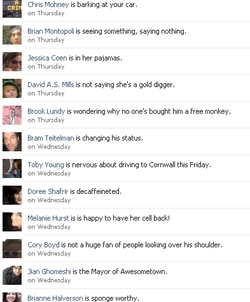 Now that's a headline I never thought I'd write. But after enjoying my weekend with TIME magazine, I am struck by how much smarter Lev Grossman's short article on Facebook is than Steven Levy's Newsweek cover story from two weeks ago. Whereas Levy spent hundreds of words rehashing the development of Facebook and the rise in popularity among the 35-and-over crowd, Grossman gives a thoughtful, almost anthropological analysis of why Facebook has been so successful and why it will continue to dominate as an internet utility as we move into the next phase of the web. Facebook is, as Grossman points out, "a Net within the Net." It succeeds because it manages to translate the networks, and more importantly the boundaries, from actual society into an internet society otherwise rife with anonymity and anarchy, and it does so with what Grossman calls a "classy, upmarket feel."
Now that's a headline I never thought I'd write. But after enjoying my weekend with TIME magazine, I am struck by how much smarter Lev Grossman's short article on Facebook is than Steven Levy's Newsweek cover story from two weeks ago. Whereas Levy spent hundreds of words rehashing the development of Facebook and the rise in popularity among the 35-and-over crowd, Grossman gives a thoughtful, almost anthropological analysis of why Facebook has been so successful and why it will continue to dominate as an internet utility as we move into the next phase of the web. Facebook is, as Grossman points out, "a Net within the Net." It succeeds because it manages to translate the networks, and more importantly the boundaries, from actual society into an internet society otherwise rife with anonymity and anarchy, and it does so with what Grossman calls a "classy, upmarket feel."
But Facebook actually one-ups real society in the way it allows users to manage their privacy settings. I realized this the other day when I noticed that a former friend, with whom I'd had a falling out, had de-friended and blocked me — her profile still exists, and my other friends are able to see it, but when I search for this blocker, nothing comes up. And if I, for example, write on any of our mutual friends' walls, she won't see it. Because she has, in effect, deleted me from her virtual world. (Ed. ETP is not taking sides; maybe you should offer her a bunny?) Our silly drama aside, objectively I had to marvel at how fantastic it was that Facebook gave her that option. Grossman's analysis succinctly sums up the duality of Facebook's appeal — its role in connecting people and in keeping them apart — and suggests that this duality is fueling the growth of the site among people 35 or older, taking the central focus of Levy's bland article and using it as pre-supposed backstory. And though he doesn't mention MySpace once, it's clear what Grossman is comparing Facebook against.
But, again ironically, it isn't just TIME that seems to grasp the real Facebook story more clearly than Newsweek. Its possibly-soon-to-be-shuttered-or-maybe-not cousin, Business 2.0, also published a super-relevant article on "The Facebook Economy" last week. Two weeks ago I suggested  that Newsweek's cover story should have explored Facebook's "unique ability to spring up a cottage industry of tech companies." The Business 2.0 piece does exactly this, analyzing the difference between the MySpace business model — which makes it hard, if not impossible, for developers to monetize popular MySpace applications — and the Facebook business model, which blows the application industry wide open and empowers developers to generate revenue from their Facebook applications in a number of ways. Facebook Platform allows developers to serve ads on their application pages, to attract sponsors for their apps, or to sell services or products directly on the site. And they get to keep 100% of the revenue generated. It's an incredibly important shift in the development of the internet application industry, and it's one that Business 2.0 hits perfectly where Newsweek missed the mark.
that Newsweek's cover story should have explored Facebook's "unique ability to spring up a cottage industry of tech companies." The Business 2.0 piece does exactly this, analyzing the difference between the MySpace business model — which makes it hard, if not impossible, for developers to monetize popular MySpace applications — and the Facebook business model, which blows the application industry wide open and empowers developers to generate revenue from their Facebook applications in a number of ways. Facebook Platform allows developers to serve ads on their application pages, to attract sponsors for their apps, or to sell services or products directly on the site. And they get to keep 100% of the revenue generated. It's an incredibly important shift in the development of the internet application industry, and it's one that Business 2.0 hits perfectly where Newsweek missed the mark.
The moral of this story appears to be, for now, that TIME seems to "get" Facebook more than Newsweek. While neither network on Facebook is heavily populated (the Time Magazine network currently has 76 members to Newsweek's 60), Richard Stengel at least has a profile (albeit with only 11 friends), while a search for Jon Meacham within the Newsweek network turns up empty. I should note that Newsweek hasn't always missed the boat entirely on Facebook. Just last September, Newsweek's Andrew Romano published a fantastic article in defense of the Facebook News Feed shortly after it launched. But Romano, and any whiff of modernity, were missing from the Newsweek cover story, suggesting that perhaps Newsweek's greatest error in that piece was assigning a 56-year old senior editor to the story rather than the 20-something Romano. Though TIME may represent the oldest of old media, its grasp of Facebook and its assignment of a 30-something tech writer to cover it suggests that it's outpacing its chief rival in the race to stay fresh, current, and, ultimately, relevant.
*Unlike Facebook, ETP editor Rachel Sklar does not respect the privacy of her friends' status updates. We are anti-privacy in addition to being anti-journalism.
Support HuffPost
Our 2024 Coverage Needs You
Your Loyalty Means The World To Us
At HuffPost, we believe that everyone needs high-quality journalism, but we understand that not everyone can afford to pay for expensive news subscriptions. That is why we are committed to providing deeply reported, carefully fact-checked news that is freely accessible to everyone.
Whether you come to HuffPost for updates on the 2024 presidential race, hard-hitting investigations into critical issues facing our country today, or trending stories that make you laugh, we appreciate you. The truth is, news costs money to produce, and we are proud that we have never put our stories behind an expensive paywall.
Would you join us to help keep our stories free for all? Your contribution of as little as $2 will go a long way.
Can't afford to donate? Support HuffPost by creating a free account and log in while you read.
As Americans head to the polls in 2024, the very future of our country is at stake. At HuffPost, we believe that a free press is critical to creating well-informed voters. That's why our journalism is free for everyone, even though other newsrooms retreat behind expensive paywalls.
Our journalists will continue to cover the twists and turns during this historic presidential election. With your help, we'll bring you hard-hitting investigations, well-researched analysis and timely takes you can't find elsewhere. Reporting in this current political climate is a responsibility we do not take lightly, and we thank you for your support.
Contribute as little as $2 to keep our news free for all.
Can't afford to donate? Support HuffPost by creating a free account and log in while you read.
Dear HuffPost Reader
Thank you for your past contribution to HuffPost. We are sincerely grateful for readers like you who help us ensure that we can keep our journalism free for everyone.
The stakes are high this year, and our 2024 coverage could use continued support. Would you consider becoming a regular HuffPost contributor?
Dear HuffPost Reader
Thank you for your past contribution to HuffPost. We are sincerely grateful for readers like you who help us ensure that we can keep our journalism free for everyone.
The stakes are high this year, and our 2024 coverage could use continued support. If circumstances have changed since you last contributed, we hope you’ll consider contributing to HuffPost once more.
Already contributed? Log in to hide these messages.


